The trauma and triumph of young girls forced from their homes
Nobel laureate Malala Yousafzai speaks exclusively to The Express Tribune about her new book and plans for the future
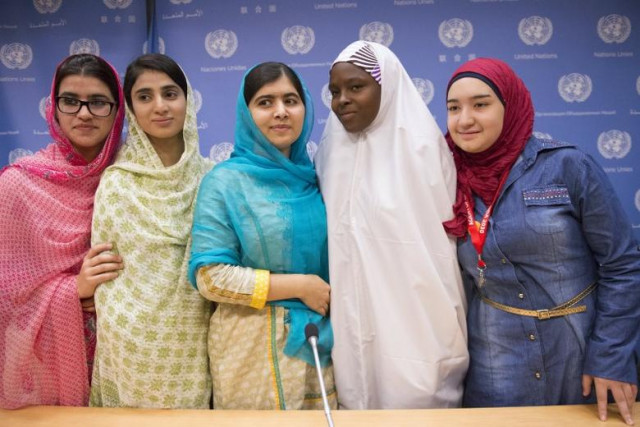
Nobel Peace Prize winner Malala Yousafzai (C) and her friends and fellow activists Kainat Riaz (L), Shazia Ramzan (2nd L), both from Pakistan, Amina Yusuf (2nd R) from Nigeria, and Salam Masri (R) from Syria. PHOTO: REUTERS
In the days to follow, the girl would become a global phenomenon. Leaders, celebrities, religious figures and children around the world would pray as she lay recovering in a Birmingham hospital.
The incident would prompt statements of firm resolve, like the United Nations saying that whenever and wherever a young girl was forbidden from going to school, it was an attack against all girls.
Rekindling the light snuffed out by patriarchal honour
Yet, little would change. Conflict would continue around the world, forcing girls from their homes and their schools. According to figures from the UN refugee agency, there are more than 68.5 million people displaced worldwide presently, most since the second world war.
The girl was a young Pakistani named Malala Yousafzai. She has recovered from the cowardly attack and continues her fight. While advocating for education, Malala has met many young girls on her travels, who are fleeing war just like she did.
During this time, she has also authored a new book titled We Are Displaced. It narrates her tale of conflict and displacement before she gives way to eight other young female refugees who tell their own stories of a somewhat similar nature.
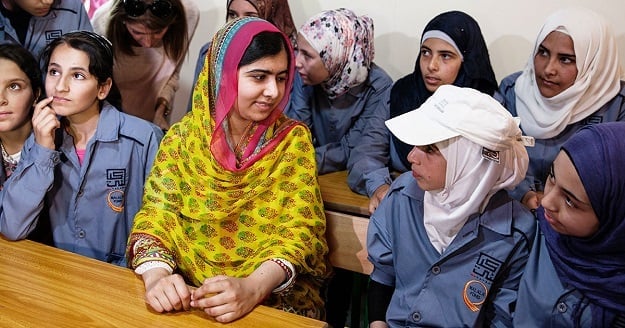 Malala speaking at Kayany’s Malala School in Bekaa Valley in Lebanon. PHOTO COURTESY: MALALA FUND
Malala speaking at Kayany’s Malala School in Bekaa Valley in Lebanon. PHOTO COURTESY: MALALA FUNDThe fable of the other Nobel laureate from Pakistan
Malala Youssafzai is the youngest Nobel Peace Prize winner and a founding member of Malala Fund, an education rights campaign. She has been advocating for the right of all girls to go to school since she was just eleven, and had her own blog on BBC Urdu.
She wrote a book, I Am Malala, to share the story of her life in October 2013. Since the attack, Malala has settled in the United Kingdom and currently studies at Oxford University.
In 2014, she won the Nobel Peace Prize for her tireless activism, aged just seventeen. She had also set up the Malala Fund in 2013 along with her father, Ziauddin Yousafzai. Malala Fund works in under-developed countries to increase education spending.
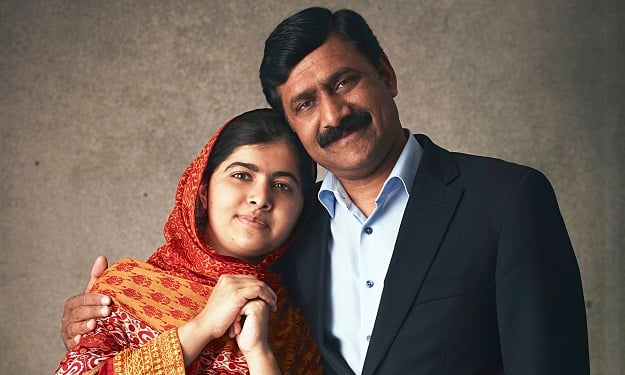 Malala Yousafzai and her father, Ziauddin Yousafzai. PHOTO: FILE PHOTO
Malala Yousafzai and her father, Ziauddin Yousafzai. PHOTO: FILE PHOTOThe incredible story of the man who raised Malala
We Are Displaced was released on January 8th, 2019 by Weidenfeld and Nicolson in the United Kingdom and Little Brown and Company in the United States. The book made it to New York Times Top Seller List a few days after the publication.
It also received positive reviews from many outlets, with the NYT terming it a stirring book which strips political baggage off words like migrants and refugees, Publishers Weekly calling it a profoundly moving volume, and Los Angeles Review describing it as a timely and heart-wrenching work about displacement.
The girls in We Are Displaced belong to many different countries and cultures, like Colombia, Guatemala, Syria, Yemen, Congo, and Bangladesh. All of them are fleeing bloodshed, with some also forced to move from places of refuge for other reasons, like racism.
Tribune Take: Reading habits of Pakistanis on print and digital
The raw testament which underlies the writing of these young women is often so emotional that it has the potential to leave the reader teary-eyed by the end of it. These girls are running away from mobs, unruly troops, vigilantes, mass murderers and genocidal maniacs.
In addition, the book details life in a foreign land for some too, which can be cold, shockingly discriminatory, empty and without the love of family, and also strange.
The Express Tribune spoke to Malala Yousafzai about her new book, education for girls and her plans for the future. Parts of the conversation with the Nobel laureate have been reproduced below for interested readers, and a short review of We Are Displaced follows the conversation.
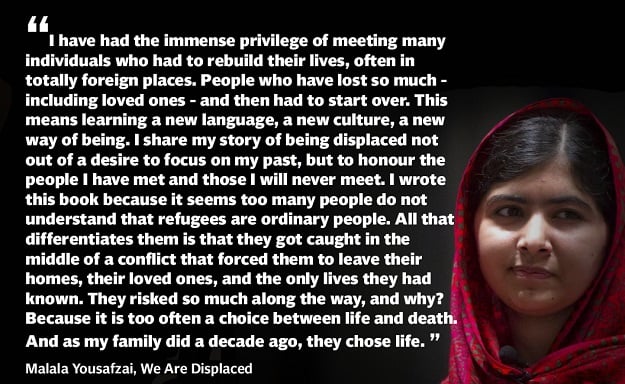 CREATIVE: IBRAHIM YAHYA
CREATIVE: IBRAHIM YAHYAIn conversation with Malala Yousafzai
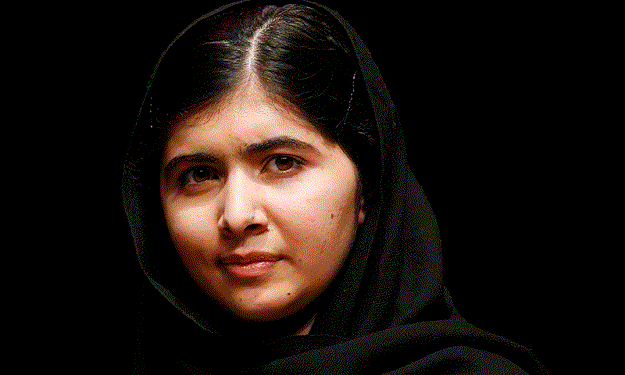 Nobel laureate Malala Yousafzai. PHOTO: REUTERS
Nobel laureate Malala Yousafzai. PHOTO: REUTERSYou have used the term 'displaced' instead of the more widely-used (albeit incorrectly) 'refugee'. Why is that distinction so important? What practical implications does the word bring along with it?
I’m not a refugee, but I did experience displacement. I want people to understand that the experiences of refugee girls and girls who are internally displaced in their own countries are similar.
Both know how difficult and dangerous it is to flee your home and both need support from the global community to ensure they can finish their education and pursue their dreams.
In the larger political debates surrounding conflict zones, the stories of individual sufferance tend to be downplayed. As an education activist, how important is it that celebrities pay attention to areas devastated by war and the impact it has on children and their futures?
More than 68.5 million people are living as refugees or internally displaced people due to conflict, persecution and natural disasters.
Most of these people are girls. This is a global issue that should concern all of us.
In We Are Displaced, girls from Yemen, Syria, Kurdistan, Colombia, Guatemala, Congo and Myanmar tell their own stories so readers can understand not just the painful parts, but how these young women have thrived despite their challenges and why education is their top priority.
Their stories also show how individuals can help refugees in their community.
In the book, you describe how during the militant occupation of your hometown Swat, it was often scary to speak against the Taliban, but the alternative, not speaking against them, was far scarier. How has Pakistan changed since then, in the context of your visit last year? What more needs to be done?
I was so happy to return to Swat Valley and see so many friends and family members. There is more peace there now — and I hope it will continue.
I am also proud to see more girls and activists fighting for education throughout Pakistan, and that more families support sending their daughters to school.
But we still have more work to do. Pakistan has the second highest number of girls out of school of any country in the world.
I am hopeful that the government will put their resources and energy behind improving our education system and getting more girls into classrooms.
In the book, you point out that developing countries host more than ninety per cent of refugees globally. How is Malala Fund helping refugee girls around the developing world?
The proceeds from We Are Displaced support Malala Fund’s work for refugee girls.
We invest in educators and activists, called Gulmakai Champions, who are fighting for policies that ease enrolment in local schools for refugees and using technology to help girls without internet catch up on coursework.
In Lebanon and Turkey, our Champions are working with Syrian refugees. In Nigeria, they are working with girls in communities affected by Boko Haram.
At Oxford, many students of Philosophy, Politics and Economics have gone on to do great things. Did your dream of going into politics influence the choice of your undergraduate degree?
My dream is to see every girl in school around the world — and I no longer think pursuing a career in politics is necessary to make that happen.
Studying Philosophy, Politics and Economics allows me to learn about the subjects I’m interested in most.
And I think it will prepare me for my future work advocating for girls’ education with Malala Fund.
You often say how much you miss being in Pakistan. What is the most wonderful thing about your home country? How do you like life in United Kingdom? When will we see you back in Pakistan?
I miss my home every day — from my friends and family, the mountains around Swat Valley, our cricket team, the food.
I am so proud of my culture and hope to return soon.
In the UK, I’ve also found a home. I’ve made so many friends and I love university life. Though, honestly, I am not a fan of all this British rain.
Can you tell us what you are currently reading?
I recently finished reading Exit West by Moshin Hamid. But I’m in university right now — so I’m mainly reading books for my Philosophy, Politics and Economics courses like Plato’s Republic.
I’m also reading more stories of incredible girls on Malala Fund’s digital publication, Assembly.
Some recent stories featured Nibras, a Yazidi refugee, and Pakistan’s all-female race car team.
Can you tell us a little bit about your future projects?
Right now I am focused on the work that my professors assign!
Beyond that, I’m continuing to work with the Malala Fund to secure a better world for girls.
We Are Displaced
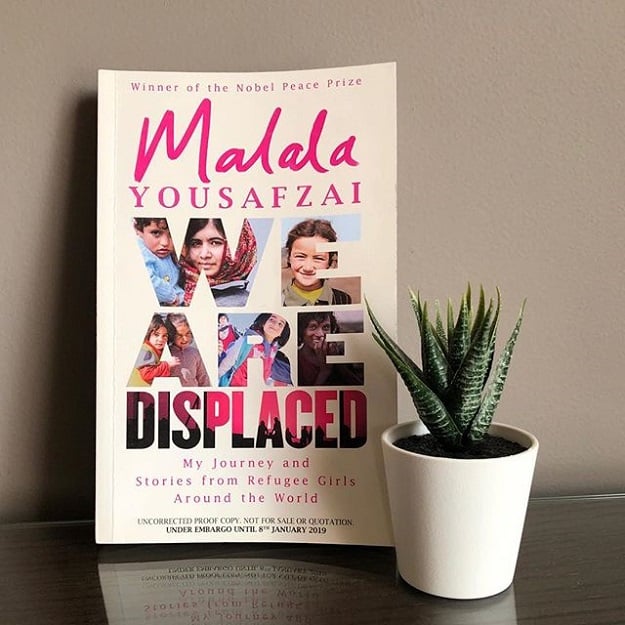 PHOTO COURTESY: THE LITERARY CAFE
PHOTO COURTESY: THE LITERARY CAFEThe book is divided into little portions detailing the ordeals of nine girls from around the world who fled their homeland in search for safety and security elsewhere. It provides the young women a platform to amplify their voice and reach the corridors of power around the world.
We hear about Maria, who ran away from her country in the middle of the night after her father was brutally murdered. There is Zaynab, who was out of school for two years as she tried to run away from war and before she found a home in the United States.
Her sister, Sabreen, also made a harrowing journey to Italy in order to run away from bloodshed and conflict. The book introduces readers to Ajida, who continues to fight to keep her family safe, even in times of peace.
Orient meets Occident as Louvre Abu Dhabi rains light on art
Jennifer, Marie Claire, Farah, Muzoon and Analisa also document their personal stories of displacement in We Are Displaced. According to Malala, the book goes beyond the numbers and statistics, and zeroes in on the real lives of the people caught in the middle of global upheaval.
In addition, the first part of the volume details the trauma and triumph of Malala herself, and how she was displaced after the Taliban tried to kill her for speaking up for the right of girls to go to school in Pakistan.
In contrast, readers also get to know about how her life changed as she survived and became an international activist for peace, becoming the youngest Nobel laureate in the world at just seventeen.
The (dis)order of time in the words of a poetic physicist
Towards the end, Malala brings readers up to date on the lives of girls who contributed to the book. She cheers on every little success that the girls have had since they settled into new homes and new environments.
Most of the girls who recount their stories were ones she had met while visiting refugee camps, schools and other places as an activist for the Malala Fund, campaigning in front of world leaders and policymakers to improve living conditions for people fleeing war.
The book is short, only 200 pages, and includes pictures of Malala with some of the girls, as well as some from when she visited Pakistan in 2018 for the first time after the attack on her life.
The business partnership between space studies and war planning
We Are Displaced reads like a very personal account of the disruption that war and conflict have wreaked upon certain parts of the world. For the lucky ones, changing homes is choice. But Malala tries to put into perspective the movement of peoples that is not about choice, but about the need to stay alive.
The deeply moving stories are heartbreaking but inspiring and focus on the strength of the human spirit. While telling her own story, Malala writes that when someone goes through a harrowing experience, there are often two extremes. "Either you lose hope completely and shatter and break into pieces, or you become so resilient that no one can break you anymore."
As politics and war reshape global order, stories of individual sufferance tend to be downplayed. This very emotional book helps readers sift through the larger narratives surrounding conflict zones, brings them face to face with the grim reality of war, and strongly communicates what it actually means to be displaced in the 21st century.



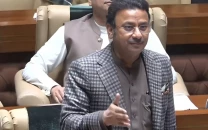















COMMENTS
Comments are moderated and generally will be posted if they are on-topic and not abusive.
For more information, please see our Comments FAQ